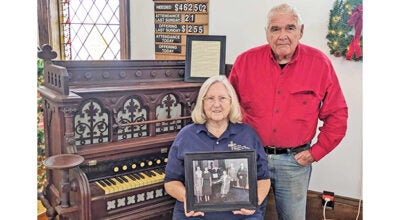Special needs kids work with dogs
Published 8:18 am Friday, May 31, 2013
By WILLIAM CRANDELL
Special to Leader Publications
Canine competition for children with disabilities is available each Monday through The Best Friends 4-H Club. For 25 years, the group has been experiencing the unconditional love of dogs.
Created in 1988 by Patti Dynes, who could not find a training club for her son, David, that would accommodate his Down syndrome, the club was formed so everyone could have an opportunity to work with animals. At first, the group met in her backyard. It has grown to average 15 to 24 special needs students per year at Mutterly Love in St. Joseph.
“One of the things that I am most impressed by is how empowering this program is for these kids,” said Vicki Williams, owner of Mutterly Love and volunteer co-coordinator for the club. “They are always being told what to do and, with this program, they are allowed to be in charge. This is a win, win for everybody. The dogs, the kids and the parents love it. It’s amazing to watch how these kids grow and learn how much they can do.”
The Best Friend 4-H Club matches a special needs child with an adult and a good-natured trained dog to combine canine therapy with competition. All of the canines that participate are certified therapy dogs and are American Kennel Club Canine Good Citizen certified. Some of the things the 4-H’ers learn through their hard work with the animals is patience, canine anatomy, learning the different types of dog breeds, canine safety, canine ownership responsibility, basic motor and communication skills and the interpersonal skills to work with others. The mission goals of the club are to provide canine therapy and an educational experience for children with special needs in a safe and supportive environment while building positive relationships between the members and their canine and having fun at the same time. But the main mission goal is for the students to walk away with a sense of empowerment and accomplishment.
One of only two canine therapy clubs in Michigan, the Berrien County organization is coordinated by Linda M. Shannon-Chaillet. One of the most important goals for Shannon-Chaillet is to have the Best Friends Club become a part of the education of all special-needs children in the state and, eventually, the country.
“I’d like to see other groups use our model to set up programs elsewhere, just take our program and run with it, make it better and make it their own,” she said. “That’s the 4-H model, and that’s what the spirit of the Best Friends Club is all about.”
The 4-H Summer Canine Therapy Dog Competition Project meets once a week on Monday nights at Mutterly Love in St. Joseph to train for the two competitions the club participates in each year. Those events are the 4-H Spring Achievement Canine Evaluation and the Berrien County Youth Fair Canine Exhibitor with Disability Dog Event. The classes they offer for these competitions are in obedience, agility, anatomy and breeds, canine safety, canine ownership and responsibility, sportsmanship and rally obedience.
“I think we both love the agility course the best, the running and the jumping,” says 14-year-old Nathene Wendzel who has participated in the program for the past 5 years.
Deb Barrett, Senior Extension Educator of the MSU Extension Children and Youth Institute who oversees the program for 4-H says that The Best Friends Club in the canine training world is very unique. “Because of this program members are able to achieve communication and agility skills that they may not have had the opportunity to strive for and experience. This program does great things and has been the highlight of my 18-year career working with 4-H.”
Nancy Agnetta, a professor of teacher education at Andrews University stated during her speech that the 4-H Best Friends Club is an invaluable tool for her curriculum and an encouraging learning experience for her students.
“Every semester, my students spend time working with the Best Friends Club to fulfill state requirements for their certification.
“In the beginning many of my students express some kind of reservation about working with special needs students because many of them have never worked with the disabled. Working with The Best Friends Club is therapy for them as well as for its members because they soon realize that students with special needs are just people with the same likes and dislikes that they have.
With this new knowledge comes confidence, they are not fearful anymore, they leave my class ready to make a difference in the world and the confidence to be good general education teachers and prepared to help special needs students who are mainstreamed into their classrooms.”
“We are fortunate that they come to our school and work with our kids; they really make a difference in the lives of our students,” says Sally Brueck, vice principal of the Blossomland Learning Center in Berrien Springs where the club works with the students once a month
“I have witnessed students opening up to these dogs that may not have had consistent communication skills.
“I’ve seen students smile who might not normally smile and laugh when working with the dogs. I truly believe in this program and, as long as I’m a part of this school, I will make sure that the dog program also remains a part of it.”
Call (269) 934-0462 for more information.





